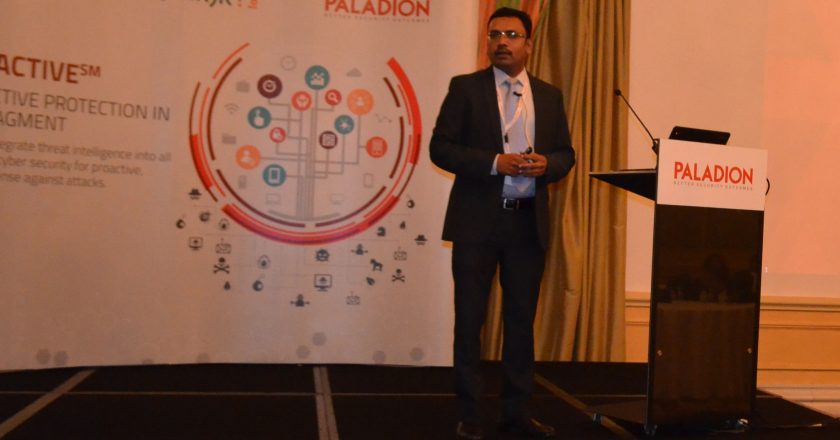The company will showcase its recently ramped up services solutions portfolio as well as the latest innovations in the secnurity space from two of its key vendor partners Kaspersky Lab and Firemon.

Westcon-Comstor Security Practice to showcase offerings at GISEC
The company will showcase its recently ramped up services solutions portfolio as well as the latest innovations in the security space from two of its key vendor partners Kaspersky Lab and Firemon.

Westcon-Comstor to demo latest offerings at GISEC
The company will showcase its recently ramped up services solutions portfolio as well as the latest innovations in the security space from two of its key vendor partners Kaspersky Lab and Firemon.
Paladion focuses on active innovation for cyber defence
Paladion to focus on how enterprises can move to a predictive cyber defense model using security frameworks that actively and continuously adapt to the changing threat landscape.

Paladion concludes its cybersecurity conference in Qatar
Paladion announced that it successfully concluded its cyber security conference in Doha, Qatar along with Kaspersky Labs.

Inside job
These days, the threat landscape for most companies is massive. But while there is a litany of outside threats that their security teams need to worry about, there is often an even greater danger much closer to home.

Risky business
On a recent trip to Dubai, Kaspersky Lab’s CEO and Founder Eugene Kaspersky took time out to tell James Dartnell about his greatest cybersecurity concerns for 2016, and the prospects for better threat defence in the enterprise and consumer spaces.

The six pillars of next-gen endpoint protection
Advancements in attack evasion techniques are making new threats extremely difficult to detect. To keep up, a new security model that uses a different approach to the traditional “evidence of compromise” process is needed.
Software AG appoints new Alliance and Channel Director
Software AG has announced the appointment of Ghassan Darri as Alliance and Channel Director for the Middle East and Turkey to further accelerate the adoption of its Digital Business Platform and bolster its growth initiatives.

Hacking Team zero-day used in new Darkhotel attacks
According to recent reports, files and tools owned by the Hacking Team that has been leaked previously has now been repurposed by a cyber-espionage group targeting luxury hotels.

The big migration
Ovanes Mikhailov, Managing Director, Middle East, Kaspersky Lab, shares insight on the top security issues IT leaders need to consider when migrating to a new OS.

Symantec uncovers Morpho hacking activities
A cyber espionage group has targeted high-profile technology, Internet, commodities and pharmaceutical companies in the US, Europe and Canada, reports Symantec.

Bad behaviour
Companies can spend untold funds on the latest security software, keep their firewalls and security infrastructure up-to-date, monitor networks, and employ the highest level of IT talent all in the name of security. However, it can all be rendered useless by one simple thing – employees choosing to ignore basic regulations.

Always be prepared
Cyber criminials are becoming more organised and taking higher bounties. Kaspersky Lab’s Cyber Security Weekend for the Middle East, Turkey and Africa kept CNME abreast of changes in the security landscape and predicted what we can expect in the coming year.
At the helm
Having gone private a year-and-a-half ago, Dell is pitching its end-to-end integrated solutions, and has chalked out a go-to-market strategy with partners playing a key role in it. We sat down with Driss Elougmani, the new GM for Dell’s recently formed Middle East Turkey and Africa business to understand the channel implications.

Faster Internet access means more cyberattacks for Africa
The rapid development of Internet access throughout Africa has not been accompanied by an equivalent increase in awareness of security …
The value quotient
Amjad Fathi Al-Omar, General Manager, Sariya IT, reveals growth strategy and channel plans for the year.

emt Distribution to participate at GISEC 2015
emt Distribution, the specialty IT security products distributor has announced its participation at GISEC 2015, the region’s leading cyber security exposition to be held from 26th to 28th April 2015 at Dubai World Trade Centre in Dubai, UAE.

‘Incredibly advanced’ hackers hit ME infrastructure
A cyber-espionage group with a toolset similar to ones used by U.S. intelligence agencies has infiltrated key institutions in countries including Iran and Russia.

Gang steals $1 billion in largest ever cyber-theft
A cybercriminal gang has stolen up to $1 billion from banks in at least 25 countries over the last two years, infiltrating networks with malware and spying on employees’ computers to facilitate large wire transfers, Kaspersky Lab has revealed.


